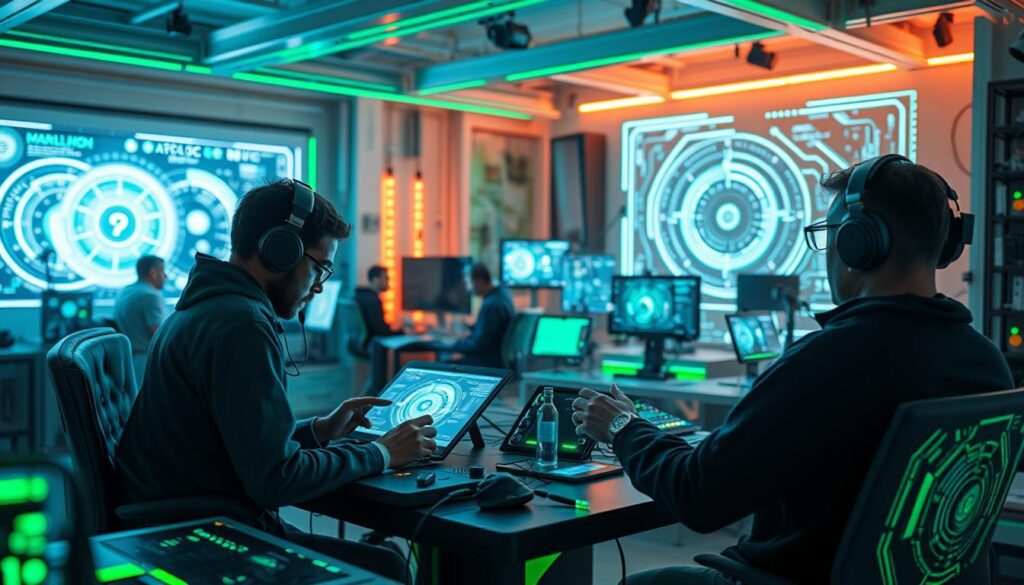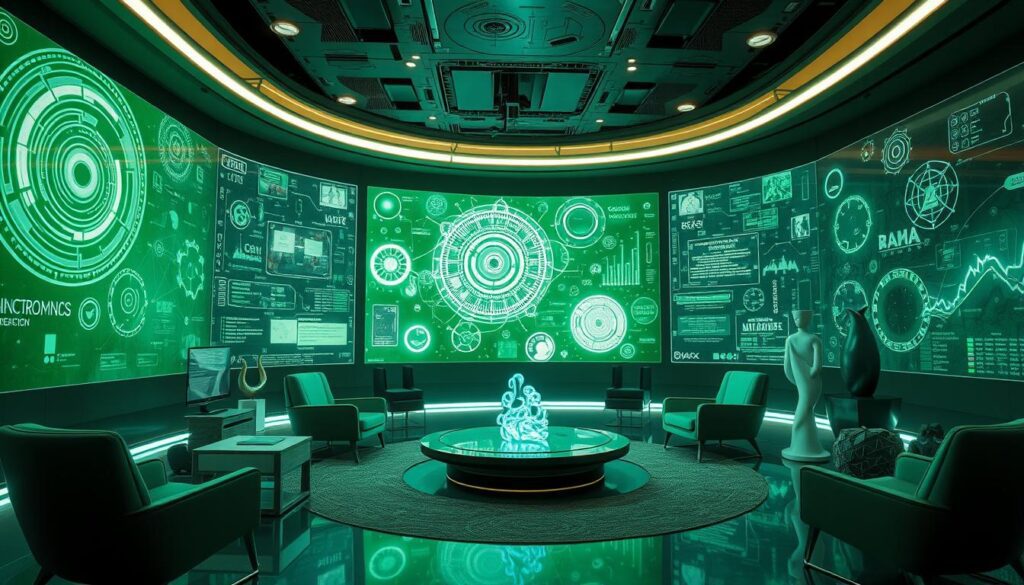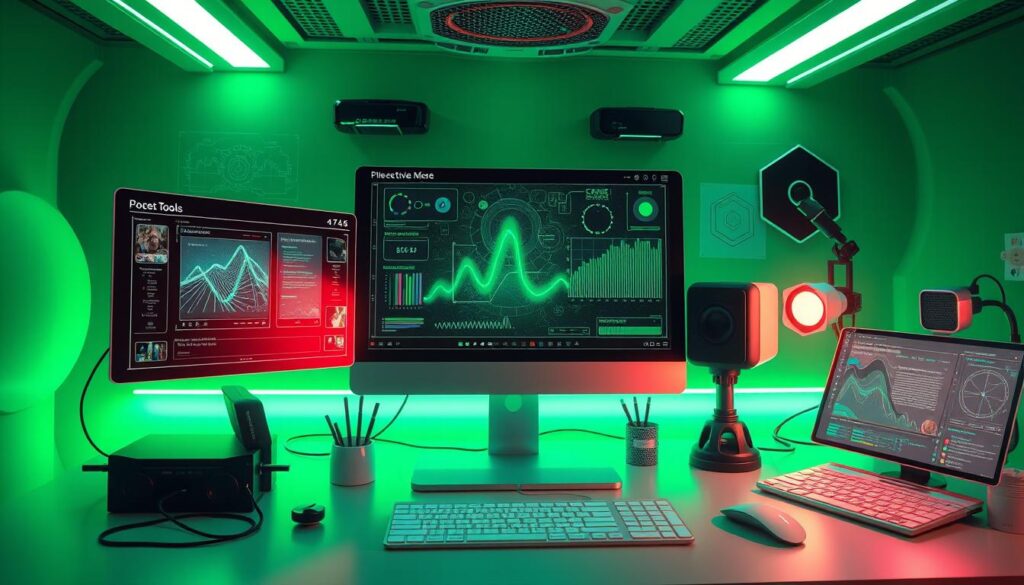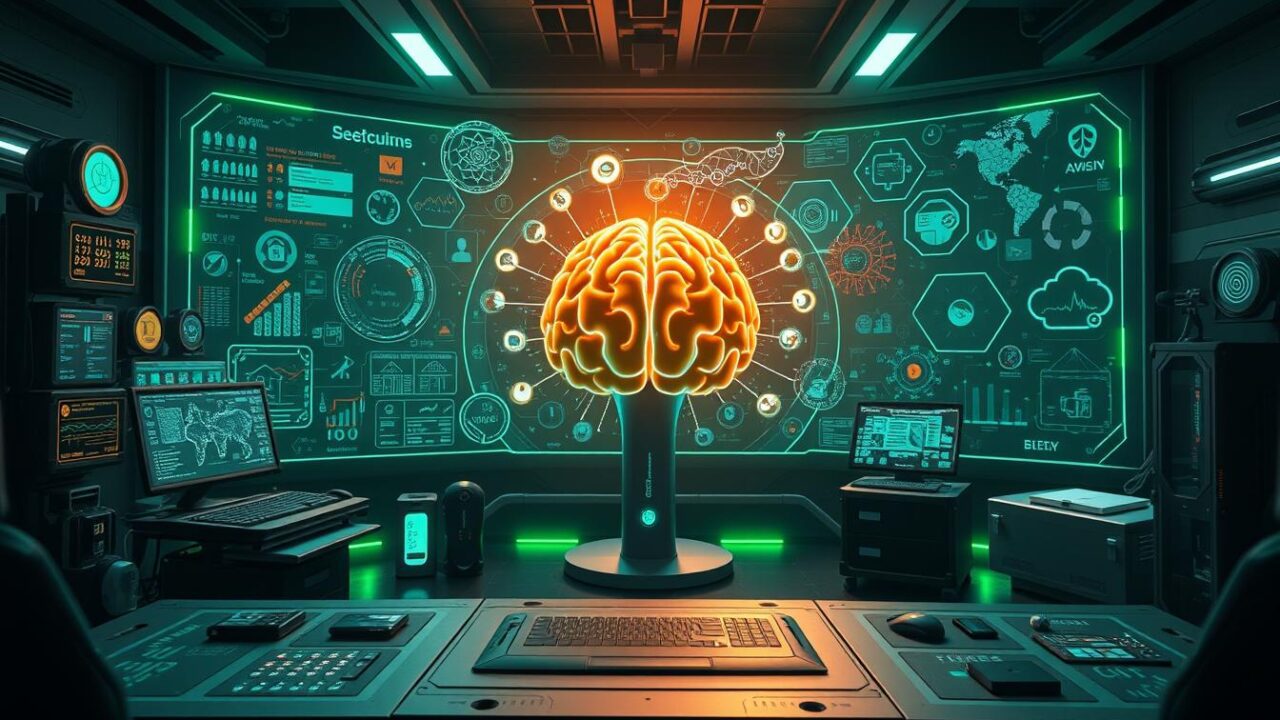Can artificial intelligence really spark creative genius in real-time? We’re seeing a big change in how ideas come to life. AI tools are changing the game, making real-time brainstorming and idea development possible like never before.
In fast-paced creative fields, AI is more than just a trend—it’s a game-changer. Almost 75% of creative pros think AI will change their jobs in the next 10 years. We’re on the edge of a new era in creating ideas.
AI’s effect on brainstorming is huge. It analyzes big data and finds new patterns, sparking fresh ideas fast. Tools like Foxy AI create content just for you, and AI edits images instantly. The creative process is changing fast.
Exploring where human creativity meets AI, we see AI doing routine tasks. This lets creators focus on the big ideas. This mix of human and AI is not just making things faster—it’s changing creative work itself.
Key Takeaways
- 75% of creatives expect AI to transform their jobs in the next 10 years
- AI-powered brainstorming tools significantly boost idea quality and originality
- Real-time AI assistance is streamlining routine creative tasks
- Personalized content creation through AI is improving customer engagement
- AI is making creative collaboration more accessible across global teams
The Rise of AI in Creative Industries

AI is changing the creative world, making new ways to think and create. It’s using natural language processing and machine learning to change how we work. This is a big deal for creators.
Impact on Modern Creators
Creative people are using AI more than ever. By 2023, almost two-thirds of marketers were using AI. They see it as a way to boost creativity, not just do tasks.
Changing Landscape of Creative Work
AI is changing how we work in creative fields. Companies using AI for marketing have seen big gains. They’ve made 5-15% more money and worked 10-30% faster.
This change is happening in many areas, like art and ads. In 2018, an AI-made art piece sold for $432,500. This was a big surprise and showed a new direction in art.
AI as a Collaborative Tool
AI is a great tool for working together, not just replacing people. It helps make things more efficient, but humans are still key for great ideas. The mix of AI and human creativity is leading to new and exciting things.
“Creativity is intelligence having fun.” – Albert Einstein
As we move forward, combining AI and human creativity will open up new possibilities. It’s an exciting time for the creative world.
Enhancing Idea Generation and Brainstorming

AI is changing how we create, making idea generation and brainstorming better. It’s changing how teams work together and come up with new ideas. Generative AI is leading this change.
AI-Powered Tools for Concept Development
AI tools are key for developing ideas. A huge 90.9% of small and medium software companies use AI now. These tools help teams follow steps, analyze problems well, and find new solutions.
Leveraging Data for Unexpected Connections
AI is great at finding patterns and connections we miss. It looks through lots of data to come up with ideas humans might not think of. This is especially useful in fashion, where 73% of executives want to use AI for trend analysis in 2024.
Case Study: Foxy AI and Content Creation
Foxy AI shows how AI can help with content creation. It makes the idea process faster, with quick prototyping. For example, a coder made a website mockup in just 37 seconds with Relume AI, showing AI’s speed.
“AI transforms brainstorming by suggesting bold ideas and maintaining a constant flow of creativity, often surpassing human hesitation.”
Using AI in brainstorming helps teams get past creative blocks and find new ideas. It combines human creativity with AI’s power, setting new standards for innovation.
Streamlining Routine Creative Processes

AI creativity tools are revolutionizing design and creation. They take over the mundane tasks, giving creatives more time for their imagination. This shift is making creative teams rethink their approach, with a focus on automation.
Design teams are now using AI to boost their speed. It’s not just about saving time; it’s about making their work more creative. AI analyzes big data, offering insights and smarter choices. This leads to better decisions at every design stage.
Automation is crucial in today’s design world. AI can resize images, create color schemes, and even suggest design tweaks. This lets designers dive deeper into their creative work. The outcome? More original and impactful projects.
AI integration in Design Thinking can enhance the overall process, providing new insights, automating parts of the design process, and improving user-centered solutions.
Getting started with AI automation is easy. Designers input data to train the AI, set up workflows, and triggers. This makes the process smooth and efficient, getting better over time. As AI learns, it matches the designer’s style and standards more closely.
The future of creativity in design is here. By using AI creativity tools and automation, we’re unlocking new doors for innovation and efficiency in the creative field.
Revolutionizing Ideation: How Artificial Intelligence Makes it Real-Time
AI is changing how we think and solve problems. It’s making idea generation, evaluation, and use faster and smarter. AI turns old brainstorming into a quick, data-based process that gives instant insights and fast prototypes.
Real-Time Data Analysis for Instant Insights
AI has changed brainstorming for the better. It uses advanced algorithms to quickly analyze lots of data. This gives teams fast feedback, helping them focus on the best ideas.
AI-Driven Rapid Prototyping
AI has made innovation much faster. Designers and developers can now make prototypes quickly. For example, a web developer can make a website mockup in under a minute. This is a great start for more work and testing.
Continuous Ideation and Iteration
AI helps ideas get better over time. It looks at user feedback and behavior to suggest improvements. This keeps ideas fresh and relevant to what users want and need.
“AI is not just a tool; it’s a creative partner that pushes the boundaries of what’s possible in real-time ideation.”
AI is changing how we innovate. It uses real-time data, quick prototyping, and ongoing improvement. This lets teams explore more ideas and make them happen faster than ever.
Personalized Content Creation with AI
AI has changed content creation in many fields. Now, we see more personalized experiences based on what people like. This change has made businesses better at connecting with their audience. It has also made customers happier and helped businesses grow.
Tailoring Content to Individual Preferences
Generative AI makes content more personal than ever. It uses lots of user data to make unique experiences. For example, Netflix’s AI helps pick shows you might like, keeping viewers coming back.
AI in Targeted Advertising
AI has also changed how ads are made. It helps write ad copy, make headlines, and design visuals that grab attention. This lets marketers make lots of content quickly. Tools like 1of10 use AI to make content that fits each group of people better, making ads more effective.
Personalization in the Music Industry
The music world has also started using AI for personal touches. AI tools make playlists and even create new songs based on what you like. They can even make music for video games and other media, fitting it to your taste.
“AI-powered content personalization can drive a 20%-30% increase in efficiency, showing tangible benefits for companies.”
Companies using AI for marketing see big wins in how well their content does. The Washington Post’s AI tool, Heliograf, has made writing news faster and reached more people. As AI gets better, we’ll see even more cool ways to make content just for you.
Overcoming Creative Blocks with AI Assistance
Creative blocks can really get in the way for artists and designers. AI brings a new way to think, helping to get past these blocks. It looks at lots of data and suggests new ideas, making old projects exciting again.
AI tools are great at mixing up old ideas. They can suggest new colors, storylines, or music. This quick thinking helps artists get out of creative ruts fast.
“AI saves valuable time for creative professionals in graphic design and copywriting, enabling greater dedication to creativity and strategy.”
AI doesn’t replace human creativity. It boosts it. AI can try out different ideas at the same time. This leads to new and interesting combinations.
For designers stuck, AI tools like UX Pilot help a lot. They let designers control the output and use human feedback. This way, designers can make better designs and be more creative.
Looking at AI as a tool to help, not replace, is key. The future of creativity is when humans and AI work together. This mix can do amazing things.
AI-Powered Collaboration and Accessibility in Creativity
AI is changing how we work together. It’s breaking down barriers and making creativity open to all. This change is thrilling and brings new chances for artists and creators everywhere.
Breaking Down Language Barriers
Natural language processing is a big deal for global teams. It lets people from different languages work together smoothly. AI translation lets creators share ideas freely, without language getting in the way. This tech is making creative partnerships worldwide.
Enhancing Accessibility for Creators with Disabilities
AI is making things fairer for creators with disabilities. Speech recognition helps those with mobility issues speak up. Predictive typing aids those with motor or cognitive challenges. AI can even turn visual elements into audio, making art accessible to everyone.
Facilitating Global Creative Partnerships
AI tools are connecting creators globally. They make it simple to share ideas, work on projects, and create together. These tools help teams manage tasks, projects, and decisions with data.
- 66% of businesses use AI to improve team collaboration
- Teams save 2-3 hours per week on meeting prep with AI
- 50% of companies report better decision-making with AI analytics
The future of creativity is all about teamwork and inclusion. With AI, we’re seeing a world where everyone can join in, no matter their language or ability. It’s an exciting time for creators everywhere.
The Future of AI in Creative Industries
The creative world is on the verge of a big change thanks to AI. Art, a 30,000-year-old tradition, is now meeting modern tech. This mix is changing how we think about creativity in many areas.
In graphic design, tools like Canva and DeepArt.io are making things easier and opening up new ideas. They look at images, find colors, and suggest designs, cutting down on time. In music, AI tools like Amper Music and LANDR are helping with composition and mastering. This lets artists focus more on their creativity.
The ad world is moving towards more personal ads. AI helps brands make ads that really speak to people. It also helps in making content that fits different groups of people.
“AI is not replacing creativity; it’s amplifying human potential in ways we’ve never seen before.”
In fashion, AI is bringing new ideas to design and performance, especially in sports clothes. AI tools help pick fabrics, create patterns, and even make virtual designs. Big sports brands are using this tech to make better sports clothes.
Looking forward, AI will likely become even more part of creative work. We expect AI to understand and share human feelings better, making creative work even more powerful. The future of creativity is about combining human ideas with AI help, leading to endless possibilities.
Conclusion
We’ve seen a big change in how we create things thanks to artificial intelligence. It’s changing how we make products, market them, and make decisions in many fields. Now, AI is leading the way in making things better and faster.
AI tools are now key in brainstorming ideas quickly. They help us come up with new ideas and test them fast. Companies like Tesla, Procter & Gamble, and Nike use AI to design and customize products. This has made a huge difference, saving up to 70% of time and cutting down errors by 20%.
AI’s role in creating new ideas will only get bigger. It will help in making marketing more personal and products on their own. As we move forward, combining AI with human creativity is key. This way, we can achieve even more in the creative world, starting a new and exciting chapter.
Want to hire me as a Consultant? Head to Channel as a Service and book a meeting.

